This article needs additional citations for verification .(November 2024) |
| |||||
| Decades: | |||||
|---|---|---|---|---|---|
| See also: | Other events of 2017 History of Suriname | ||||
Events from the year 2017 in Suriname
This article needs additional citations for verification .(November 2024) |
| |||||
| Decades: | |||||
|---|---|---|---|---|---|
| See also: | Other events of 2017 History of Suriname | ||||
Events from the year 2017 in Suriname

Suriname, officially the Republic of Suriname, is a country in northern South America, sometimes considered part of the Caribbean and the West Indies. It is a developing country with a medium level of human development; its economy is heavily dependent on its abundant natural resources, namely bauxite, gold, petroleum, and agricultural products. Suriname is a member of the Caribbean Community (CARICOM), the United Nations, the Organisation of Islamic Cooperation and the Organization of American States.

Politics of Suriname take place in a framework of a representative democratic assembly-independent republic, whereby the president of Suriname is the head of state and head of government, and of a pluriform multi-party system. Executive power is exercised by the government. The executive power is dependent on the Parliament in theory. Legislative power is vested in both the government and the National Assembly. The judiciary is independent of the executive and the legislature.
After the creation of the Statute of the Kingdom of the Netherlands, the Royal Netherlands Army was entrusted with the defence of Suriname, while the defence of the Netherlands Antilles was the responsibility of the Royal Netherlands Navy. The army set up a separate Netherlands Armed Forces in Suriname. Upon independence in 1975, this force was turned into the Surinamese Armed Forces. On February 25, 1980, a group of 15 non-commissioned officers and one junior officer, under the leadership of sergeant major Dési Bouterse, staged a coup d'état and overthrew the Government. Subsequently, the SKM was rebranded as the National Army.

As part of the foreign relations of Suriname, the country is a participant in numerous international organizations.

Paramaribo is the capital and largest city of Suriname, located on the banks of the Suriname River in the Paramaribo District. Paramaribo has a population of roughly 241,000 people, almost half of Suriname's population. The historic inner city of Paramaribo has been a UNESCO World Heritage Site since 2002.
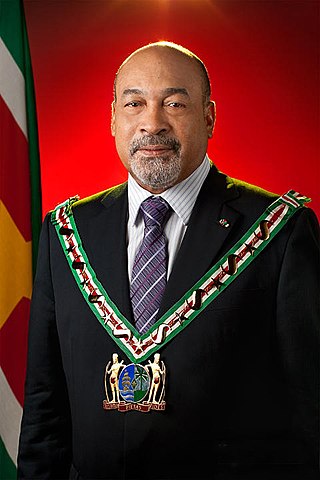
Desiré Delano Bouterse was a Surinamese military officer, politician, convicted murderer, and drug trafficker who served as President of Suriname from 2010 to 2020. From 1980 to 1987, he was Suriname's de facto leader after conducting a military coup and establishing a period of military rule. In 1987, Bouterse founded the National Democratic Party (NDP). On 25 May 2010, Bouterse's political alliance, the Megacombinatie, which included the NDP, won the parliamentary elections, and on 19 July 2010, Bouterse was elected as President of Suriname with 36 of 50 parliament votes. He was inaugurated on 12 August 2010.

The president of the Republic of Suriname is, in accordance with the Constitution of 1987, the head of state and head of government of Suriname, and commander-in-chief of the Suriname National Army (SNL). The president also appoints a cabinet.

The National Democratic Party is a political party in Suriname. It was founded on 4 July 1987 by Surinamese leader Dési Bouterse, and was one of the first parties in the country to have a stable base of support across different ethnic groups. In the 2015 general election the party scored 45.56% of the vote and 26 of 51 seats in parliament.
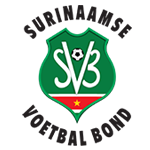
The Suriname national football team represents Suriname in international football. The team is controlled by the Surinamese Football Association, which is a member of CONCACAF.
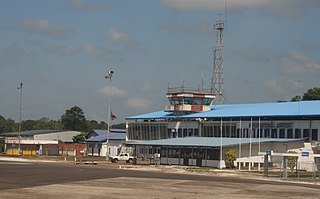
Johan Adolf Pengel International Airport, also known as Paramaribo-Zanderij International Airport, and locally referred to simply as JAP, is an airport located in the town of Zanderij and hub for airline carrier Surinam Airways, 45 kilometres (28 mi) south of Paramaribo. It is the larger of Suriname's two international airports, the other being Zorg en Hoop with scheduled flights to Guyana, and is operated by Airport Management, Ltd./ NV Luchthavenbeheer.
The December murders were the murders on 7, 8, and 9 December 1982, of fifteen prominent young Surinamese men who had criticized the military dictatorship then ruling Suriname. Thirteen of these men were arrested on December 7 between 2 am and 5 am while sleeping in their homes. The other two were Surendre Rambocus and Jiwansingh Sheombar who were already imprisoned for attempting a countercoup in March 1982. Soldiers of Dési Bouterse took them to Fort Zeelandia, where they were heard as "suspects in a trial" by Bouterse and other sergeants in a self-appointed court. After these "hearings" they were tortured and shot dead. The circumstances remain unclear. On 10 December 1982, Bouterse claimed on national television that all of the detainees had been shot dead "in an attempt to flee".

The Suriname River is 480 kilometres (300 mi) long and flows through the country of Suriname. Its sources are located in the Guiana Highlands on the border between the Wilhelmina Mountains and the Eilerts de Haan Mountains. The source of the Upper Suriname River is at the confluence of the Gran Rio and Pikin Rio near the village of Goddo. The river continues shortly after the reservoir along Brokopondo as the Lower Suriname River. Than it flows Berg en Dal, the migrant communities Klaaskreek and Nieuw-Lombé, Jodensavanne, Carolina, Ornamibo and Domburg, before reaching the capital Paramaribo on the left bank and Meerzorg on the right bank. At Nieuw-Amsterdam it is joined by the Commewijne and immediately thereafter at the sandspit Braamspunt it flows into the Atlantic Ocean.

Indo-Surinamese, Indian-Surinamese, or Hindustani Surinamese are nationals of Suriname who trace their ancestry to the Indian subcontinent. Their ancestors were indentured labourers brought by the Dutch and the British to the Dutch colony of Suriname, beginning in 1873 and continuing during the British Raj. Per the 2012 Census of Suriname, 148,443 citizens of Suriname are of Indo-Surinamese origin, constituting 27.4% of the total population, making them the largest ethnic group in Suriname on an individual level. They are a subgroup of Asian Surinamese and Indo-Caribbean people.
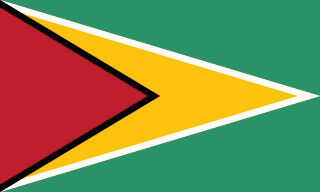
Guyana, officially the Co-operative Republic of Guyana, is a country on the northern coast of South America, part of the historic mainland British West Indies. Georgetown is the capital of Guyana and is also the country's largest city. Guyana is bordered by the Atlantic Ocean to the north, Brazil to the south and southwest, Venezuela to the west, and Suriname to the east. With a land area of 214,969 km2 (83,000 sq mi), Guyana is the third-smallest sovereign state by area in mainland South America after Uruguay and Suriname, and is the second-least populous sovereign state in South America after Suriname; it is also one of the least densely populated countries on Earth. The official language of the country is English, although a large part of the population is bilingual in English and the indigenous languages. It has a wide variety of natural habitats and very high biodiversity. The country also hosts a part of the Amazon rainforest, the largest tropical rainforest in the world.
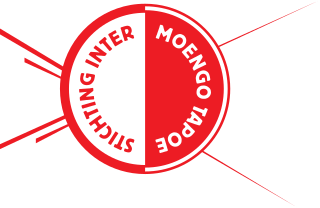
Inter Moengotapoe is a Surinamese football club, based in Moengo, Marowijne between Paramaribo and the border town of Albina. They play their home matches at the Ronnie Brunswijkstadion.

Chandrikapersad "Chan" Santokhi is a Surinamese politician and former police officer who is the 9th president of Suriname, since 2020. After winning the 2020 elections, Santokhi was the sole nominee for president of Suriname. On 13 July, Santokhi was elected president by acclamation in an uncontested election. He was inaugurated on 16 July.

The nations of Mexico and Suriname established diplomatic relations in 1975. Both nations are members of the Association of Caribbean States, Community of Latin American and Caribbean States, Organization of American States and the United Nations.

N.V. Dash F.C. Inter Wanica, referred to as Inter Wanica, is a football club located in Meerzorg, Suriname.
Politie Voetbal Vrienden, until 2018 Politie Voetbal Vereniging, known as PVV, is a Surinamese football club from the capital city Paramaribo.
The COVID-19 pandemic in Suriname was caused by Severe acute respiratory syndrome coronavirus 2. The virus was confirmed to have reached Suriname on 13 March 2020. The case was a person who travelled from the Netherlands the previous week. On 3 April 2020, one person died. On 3 May 2020, all nine cases had recovered. On 18 May, an eleventh case was identified.
He was later democratically elected as president from 2010 to 2020.